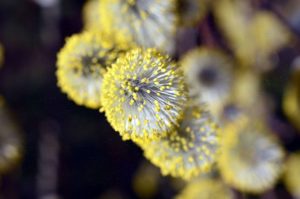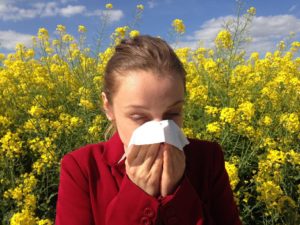Managing Springtime Allergies

springtime pollen
Ah, spring…time to stop and smell the roses. Or perhaps not! When winter ends, most people want to be outdoors as much as possible if the weather is conducive. However, you may be so affected by seasonal allergies that you want to avoid spring flowers, not enjoy them! Each spring, pollen spreads through the air and fertilizes plants. When people with allergies breathe in this pollen, their body identifies it as a threat, which can trigger an allergic reaction.
Allergy Symptoms
Pollen allergy causes a person to experience any or all of the following symptoms:
- itchy or watery eyes
- itchy throat
- rhinitis (runny or stuffy nose)
- sneezing
- a stuffy nose
- wheezing
- fatigue
Symptom Management
The cause of a patient’s symptoms should be confirmed through in-office skin testing. Once a patient’s allergens have been identified, a physician can provide the appropriate treatment recommendation. Knowing which pollen types a person is allergic to can guide them in determining when to start taking medications and the best times to avoid the outdoors, because in general, the first level of treatment is avoidance. However, if avoidance is not practical, there are a number of medications now available over the counter which were previously available only by prescription. Appropriate treatments to manage seasonal allergies can include:
- Antihistamines such as cetirizine (Zyrtec) or loratadine (Claritin). A person should start taking these medications two to three weeks before allergy season begins.
- Nasal sprays to temporarily relieve the itching and congestion. These include decongestants, which are only a short-term solution for swelling. (Note: nasal decongestants should be not be used for more than three days due to the risk of rebound or worsening nasal congestion.) Nasal saline rinses are helpful in relieving the irritation to the nasal tissue and flushing out mucous and trapped allergens.
- Immunotherapy tablets or shots to desensitize the body to pollen.
- Nasal corticosteroid sprays are effective in reducing inflammation, sneezing, watery eyes, post-nasal drip, and other related symptoms.

Springtime allergies
Most treatments only help manage allergy symptoms, but cannot cure them. Immunotherapy may be helpful for long-term allergy management but can take several years to complete.
If you are dealing with seasonal allergies this spring, there are ways you can manage them so that you can enjoy this time of year more.
- Know your triggers. The American College of Allergy, Asthma, and Immunology reports that more than two-thirds of spring allergy sufferers actually have year-round symptoms, but their symptoms just aren’t as noticeable during other times of year. Know what triggers your allergic reactions and make plans to help manage your symptoms.
- Check weather reports. Pollen.com provides a daily/weekly pollen and mold count. Checking this report can help you know what to expect when you need to be outdoors, as well as if there are certain days or times during which avoidance may be your best defense against an allergy attack.
- Take precautions. Take the medications prescribed by your doctor or the OTC versions recommended by them. If you know you are going to be outside for an extended period of time performing tasks such as mowing the lawn or cleaning a pool, consider wearing a mask to help reduce the amount of allergens you inhale.
- Shower often. Taking a shower, washing your hair, and changing clothes after being outdoors can help minimize your exposure to allergens.
At Entirely Kids Pediatrics, we offer comprehensive care to help manage allergies in children year-round.
